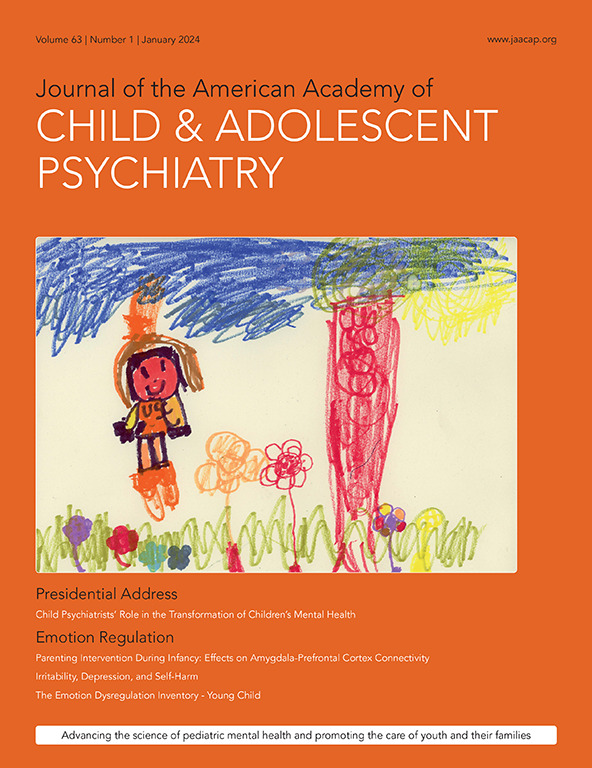Systematic Review and Meta-Analysis: Effects of Pharmacological Treatment for Attention-Deficit/Hyperactivity Disorder on Quality of Life
IF 9.5
1区 医学
Q1 PEDIATRICS
Journal of the American Academy of Child and Adolescent Psychiatry
Pub Date : 2024-05-30
DOI:10.1016/j.jaac.2024.05.023
引用次数: 0
Abstract
Objective
We conducted a systematic review and meta-analysis to quantify the effect of attention-deficit/hyperactivity disorder (ADHD) medication on quality of life (QoL), and to understand whether this effect differs between stimulants and nonstimulants.
Method
From the dataset of a published network meta-analysis (Cortese et al., 20181), updated on 27th February 2023 (https://med-adhd.org/), we identified randomized controlled trials (RCTs) of ADHD medications for individuals aged 6 years or more with a diagnosis of ADHD based on the DSM (from third to fifth editions) or the International Classification of Diseases (ICD; ninth or tenth revision), reporting data on QoL (measured with a validated scale). The risk of bias for each RCTs was assessed using the Cochrane Risk of Bias tool 2. Multilevel meta-analytic models were conducted with R 4.3.1.
Results
We included 17 RCTs (5,388 participants in total; 56% randomized to active medication) in the meta-analyses. We found that amphetamines (Hedge's g = 0.51, 95% CI = 0.08, 0.94), methylphenidate (0.38; 0.23, 0.54), and atomoxetine (0.30; 0.19, 0.40) were significantly more efficacious than placebo in improving QoL in people with ADHD, with moderate effect size. For atomoxetine, these effects were not moderated by the length of intervention, and did not differ between children/adolescents and adults.
Conclusion
In addition to being efficacious in reducing ADHD core symptom severity, both stimulant and nonstimulant medications are efficacious in improving QoL in people with ADHD, albeit with lower effect sizes. Future research should explore whether, and to what degree, combining pharmacological and nonpharmacological interventions is likely to further improve QoL in people with ADHD.
Plain language summary
From a prior dataset of a network meta-analysis, 17 randomized controlled trials (RCTs) were included in a meta-analysis to investigate if attention-deficit/hyperactivity disorder (ADHD) medication improves quality of life (QoL) in people with ADHD. The analysis showed that medications such as amphetamines, methylphenidate, and atomoxetine improved QoL compared to placebo, with moderate effect sizes. This study underscores the importance of ADHD medications, both stimulants and nonstimulants, not only in alleviating core ADHD symptoms but also in enhancing overall QoL for individuals with ADHD.
Study preregistration information
Effects of pharmacological treatment for ADHD on quality of life: a systematic review and meta-analysis; https://osf.io/; qvgps.
系统回顾与元分析:注意缺陷/多动障碍药物治疗对生活质量的影响》。
目的我们进行了一项系统综述和荟萃分析,以量化ADHD药物对QoL的影响,并了解这种影响在兴奋剂和非兴奋剂之间是否存在差异:从2023年2月27日更新的已发表网络荟萃分析(Cortese等人,20181)数据集(https://med-adhd.org/)中,我们确定了针对年龄在6岁或6岁以上、根据DSM(从第III版到第5版)或ICD(第9版或第10版)诊断为ADHD、报告QoL数据(用有效量表测量)的ADHD药物随机对照试验(RCT)。采用 Cochrane Risk of Bias 工具 2 评估了每项 RCT 的偏倚风险。使用 R 4.3.1 建立了多层次荟萃分析模型:我们在荟萃分析中纳入了 17 项研究性临床试验(共有 5388 名参与者;56% 随机接受了有效药物治疗)。我们发现,安非他明(Hedge's g = 0.51, 95% CI = 0.08, 0.94)、哌醋甲酯(0.38; 0.23, 0.54)和阿托西汀(0.30; 0.19, 0.40)在改善多动症患者生活质量方面的疗效明显优于安慰剂,且效应大小适中。对于阿托西汀来说,这些效果并不因干预时间的长短而调节,在儿童/青少年和成人之间也不存在差异:讨论:刺激性药物和非刺激性药物除了能有效降低多动症核心症状的严重程度外,还能有效改善多动症患者的生活质量,尽管效应大小较低。未来的研究应探讨药物治疗与非药物治疗相结合是否以及在多大程度上有可能进一步改善多动症患者的生活质量:多动症药物治疗对生活质量的影响:系统综述和荟萃分析》; https://osf.io/; qvgps。
本文章由计算机程序翻译,如有差异,请以英文原文为准。
求助全文
约1分钟内获得全文
求助全文
来源期刊
CiteScore
21.00
自引率
1.50%
发文量
1383
审稿时长
53 days
期刊介绍:
The Journal of the American Academy of Child & Adolescent Psychiatry (JAACAP) is dedicated to advancing the field of child and adolescent psychiatry through the publication of original research and papers of theoretical, scientific, and clinical significance. Our primary focus is on the mental health of children, adolescents, and families.
We welcome unpublished manuscripts that explore various perspectives, ranging from genetic, epidemiological, neurobiological, and psychopathological research, to cognitive, behavioral, psychodynamic, and other psychotherapeutic investigations. We also encourage submissions that delve into parent-child, interpersonal, and family research, as well as clinical and empirical studies conducted in inpatient, outpatient, consultation-liaison, and school-based settings.
In addition to publishing research, we aim to promote the well-being of children and families by featuring scholarly papers on topics such as health policy, legislation, advocacy, culture, society, and service provision in relation to mental health.
At JAACAP, we strive to foster collaboration and dialogue among researchers, clinicians, and policy-makers in order to enhance our understanding and approach to child and adolescent mental health.

 求助内容:
求助内容: 应助结果提醒方式:
应助结果提醒方式:


